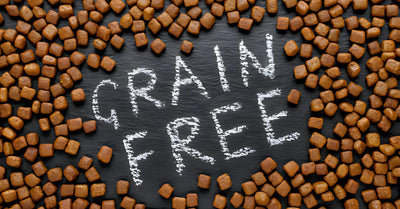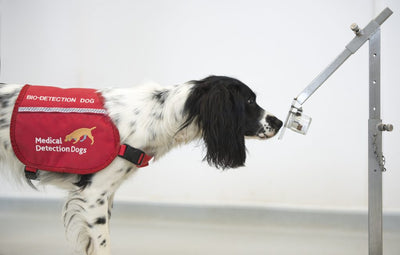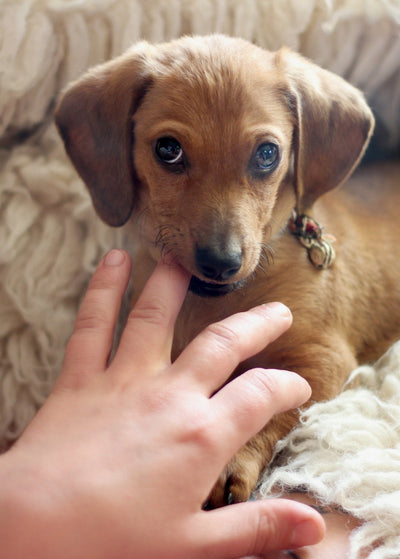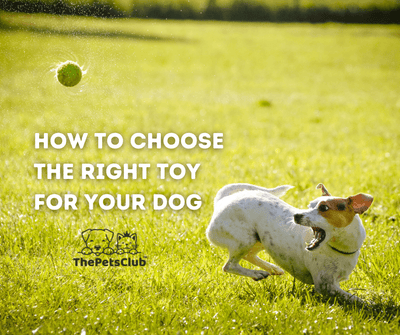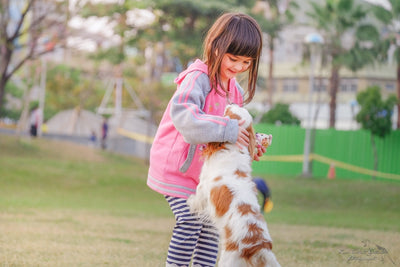 Spend AED 100 more for Free Shipping!
Spend AED 100 more for Free Shipping!
Top 10 Safe House Plants for Homes with Cats

10 Safe House Plants for Homes with Cats
Designing a lovely and secure indoor garden for your house and your cat is simpler than you imagine. These ten cat-friendly plants not only flourish inside but are also safe for your feline pals. These plants can survive low humidity and air-conditioned environments whether you are in Dubai, Abu Dhabi, or anyplace else in the UAE.
Quick List of Cat-Safe Plants:
- Spider Plant: Easy to care for, non-toxic, and helps to clean the air.
- Areca Palm: Cleans the air and adds tropical appeal.
-
Boston Fern: Lush and safe, enjoys wet circumstances.
- Calathea: its bright greenery, it catches the eye; it prefers moderate light.
-
Parlor Palm: Elegant and low-maintenance, Parlor Palm is great for low-light conditions.
- Ponytail Palm: Drought-tolerant plant with a special appearance
- Cat Grass: Nutritional and fun for cats to nibble on.
- Haworthia: Great for tiny areas, compact plant.
- Money Tree: Brings wonderful energy and greenery to your area.
-
Moth Orchids: Elegant and secure, perfect for UAE residences.
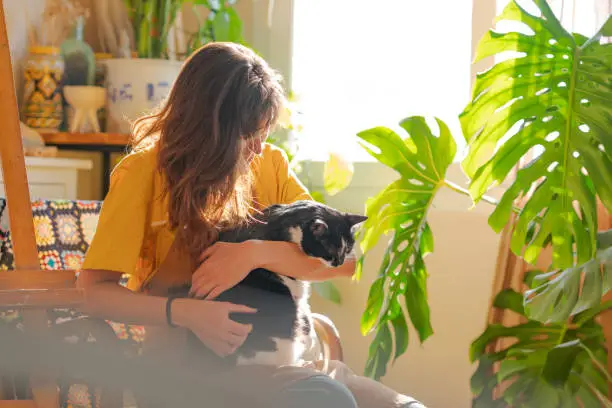
Important Care Tips for UAE Homes:
- Light: Most plants flourish in bright, indirect sunshine.
- Humidity: Fight dry air from AC by using pebble trays or sprinkling.
- Placement: Use high shelves or hanging pots to keep plants out of your cat's reach.
- Watering: Change watering times depending on the season and plant kind.
Perfect for UAE homes, these plants are not only safe but also simple to maintain. Begin with one or two and design a pet-friendly indoor garden right now!
17 Common Houseplants That Are NON-TOXIC To Cats
1. Spider Plant (Chlorophytum comosum)
Your animal buddies are protected with Spider Plants. Should your cat choose to chew on the leaves, not to panic. It's especially popular among pet owners for its non-toxic nature.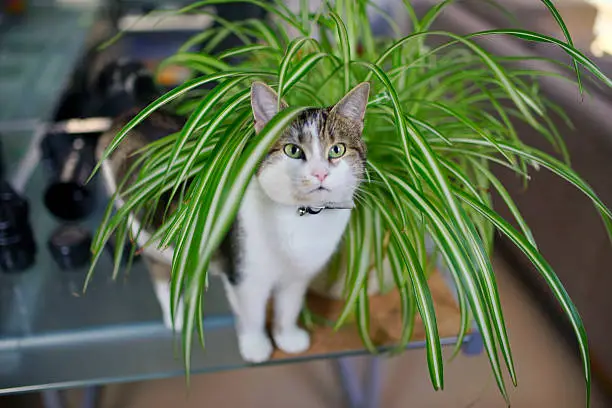
Pet-Safe and Worry-Free
Good news for cat owners: Spider Plants are completely safe for your furry friends. Even if your cat decides to nibble on the leaves, there's no need to worry [2] .
Keeping It Indoor Healthy
Here is how to make sure your Spider Plant thrives in the UAE:
- Light Needs: To prevent leaf damage, put it in bright, indirect light. A location close to a north-facing window with a sheer curtain fits just well.
- Temperature: Room temperature should be between 15–27°C (60–80°F), which fits nicely with air-conditioned houses in the UAE [3] .
- Humidity: These plants thrive at the lower humidity levels common in indoor, air-conditioned environments.
Your Spider Plant may flourish easily in your house under these basic circumstances.
Where to Find and How Much It Costs
Spider Plants are readily available at garden shops or via internet retailers all throughout the UAE. Typically ranging from AED 17 for smaller types to AED 47 for bigger ones, their prices are reasonable for pet-safe house decoration.
Why It’s a Great Choice
The Spider Plant's capacity to generate "spiderettes," tiny offshoots you may propagate to create new plants, is among its most fascinating features. [2] . This feature not only adds charm to its appearance but also makes it a cost-effective way to expand your indoor garden.
Low-Maintenance Care for Busy Households
Perfect for hectic UAE homes, Spider Plants are tolerant and can tolerate sporadic neglect or light change. Whether you are an experienced plant parent or just beginning, this plant is a simple and gratifying option.
2. Areca Palm (Dypsis lutescens)
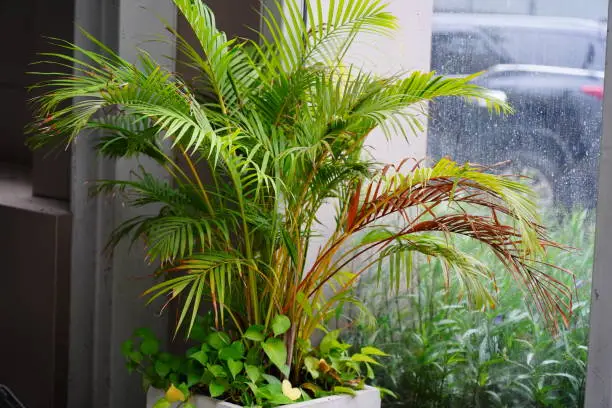
Though being totally safe for cats, the Areca Palm adds a little of tropical appeal to houses in the UAE. Not only can this beautiful plant improve your interior design, but it also cleans the air, so it's a great option for pet owners..
A Safe Option for Cats
Good news for cat lovers: the Areca Palm is non-toxic to your feline friend [4] . Though your cat may sometimes chew on the fronds, it won't hurt them. Just watch out for overindulgence as it could cause little stomach disturbance.
Improving Your Living Space
Apart from its beauty, the Areca Palm is a natural air filter, hence lowering allergens and promoting a more peaceful surroundings.
Caring for Your Areca Palm in the UAE
Follow these care recommendations to make sure your Areca Palm flourishes in the local climate:
- Light: For around 4-5 hours each day, put it in a location with bright, indirect sunlight, like near east- or west-facing windows. [5] .
- Temperature: Maintain the room temperature between 18°C and 24°C, which is perfect for its development [6] .
- Watering: Let tap water soak for 24 to 48 hours before use; use dechlorinated water [6] .
- Humidity: To keep moisture levels within, mist the leaves often. [4] .
These simple steps will help your Areca Palm stay healthy and vibrant, making it a standout feature in your pet-friendly home.
Tips for Pet Owners
- Put the palm away from where your cat enjoys perching or climbing. A little spray of citrus-infused water at the base can deter creeping [4] .
- Use a moist towel to clean the leaves periodically to eliminate dust and maintain their fresh appearance [6] .
Addressing Common Problems
Yellow-green leaves indicate the plant is receiving the correct quantity of light [5] . However, brown tips might indicate watering issues - either too much or too little [6] .
Helpful Hint
When shopping for an Areca Palm, choose one with bright, yellow-green fronds and no brown tips. This indicates the plant is in excellent condition [5] .
3. Boston Fern (Nephrolepis exaltata)
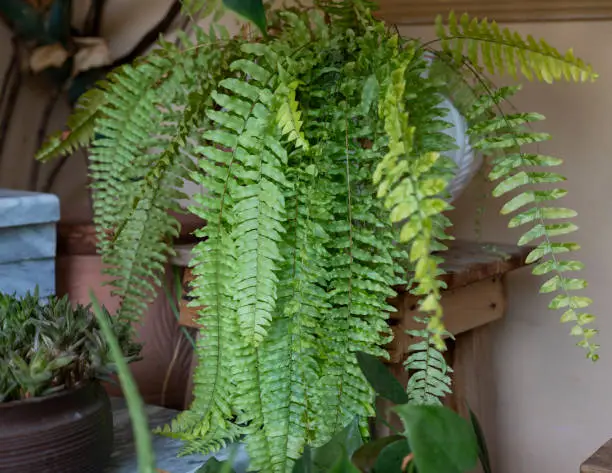
The Boston Fern is a lush, safe choice for homes in the UAE with cats. While it’s non-toxic, eating too much of it can lead to mild stomach upset, vomiting, or irritation due to its fibrous texture [7] .
Smart Placement Tips
To keep both your fern and your cat out of harm’s way:
- Hang the fern in a basket to keep it out of reach.
- Place it on high shelves or tall plant stands.
- Use rooms where your cat has limited or no unsupervised access.
Gentle Deterrent Ideas
If your cat seems overly curious about the fern, try these pet-friendly solutions:
- Spray a mix of equal parts water and white vinegar around the plant.
- Use a pet-safe Bitter Apple spray near the base.
- Avoid spicy deterrents that could irritate or harm your cat.
Now, let’s look at how to care for your Boston Fern so it thrives in the UAE.
Caring for Boston Ferns in the UAE
Boston Ferns flourish when provided with the following conditions:
| Care Aspect | Requirement |
| Light | Bright, indirect sunlight |
| Temperature | 18°C to 24°C |
| Humidity | High – regular misting helps |
| Watering | Keep the soil consistently moist |
Keeping Pets and Plants Happy
To maintain a healthy fern and a happy cat:
- Offer alternatives like catnip, cat thyme, or wheatgrass to divert your cat's attention [7] .
- Provide plenty of toys and schedule regular playtime to keep your cat entertained.
- Check your fern regularly for signs of damage or tampering.
4. Calathea (Calathea spp.)
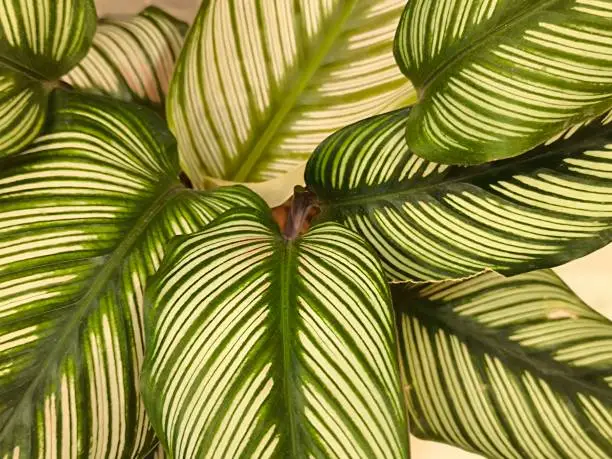
Calathea, also known as the prayer plant, gets its nickname because its leaves fold up at night and unfurl in the morning. This tropical beauty is not only eye-catching but also perfectly safe for your feline companions [9] .
Safety Profile
Calathea is a pet-friendly plant. As Matt Slaymaker puts it:
"All Calathea varieties are non-toxic to both cats and dogs, making them a safe addition to pet-friendly homes."
– Matt Slaymaker, Author at Lively Root [8]
While it’s safe, an overenthusiastic nibble might cause mild stomach discomfort. If that happens, it’s always a good idea to check with your vet [8] .
Growing Calathea in UAE Conditions
Calatheas thrive in tropical environments, but with the right care, they can flourish in UAE homes too. Here’s how to keep them happy:
| Care Aspect | Requirement | Tips for UAE Climate |
| Temperature | 18°C – 30°C | Keep away from direct air conditioning drafts. |
| Light | Medium to bright indirect | Avoid direct sunlight; place in shaded areas indoors. |
| Humidity | 60% or higher | Use a pebble tray or humidifier to maintain moisture. |
| Watering | Every 1-2 weeks | Use distilled, filtered, or rainwater at room temperature. |
Troubleshooting Common Issues
- Curling leaves: Usually a sign of low humidity or underwatering.
- Yellowing lower leaves: This often indicates overwatering.
- Brown leaf edges: Could be caused by tap water minerals or insufficient humidity.
Where to Purchase
If you’re in the UAE, you can find a variety of Calatheas at reasonable prices:
- Calathea Orbifolia: AED 69.00 at Plantsworld.ae
- Calathea Medallion: AED 110.00 at My Green Leaf
- Calathea Roseopicta: AED 45.00 at My Green Leaf
Pro Tip:
When picking a Calathea, look for plants with lush, vibrant leaves and no signs of browning or yellowing. Some retailers, like Plantsworld.ae, even include a complimentary plastic pot with your purchase [10] .
5. Parlor Palm (Chamaedorea elegans)
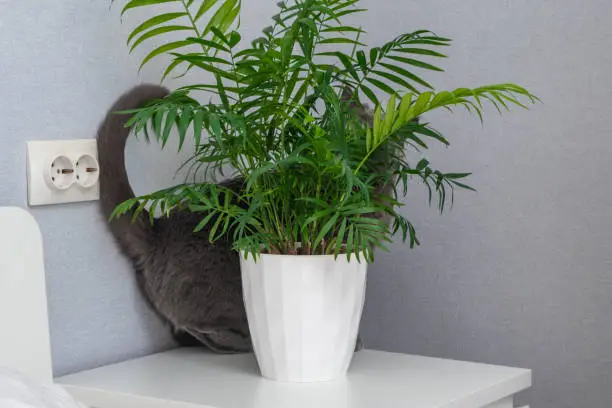
The Parlor Palm is a favourite among indoor plant enthusiasts, especially for those seeking a cat-friendly option. Here's how to care for this elegant palm in UAE homes.
Safety Profile
"The Parlour Palm is considered NON-TOXIC to both cats and dogs" [12]
While it's safe for pets, keep an eye on your cat’s interactions with the plant. Eating too much of it could lead to mild stomach upset [11] .
Growing Requirements in UAE
Let’s take a closer look at what this palm needs to thrive in your home:
| Care Aspect | Requirement |
| Light | Bright, indirect light - ideal near north or east-facing windows |
| Temperature | 18°C–24°C, avoid placing it near AC vents |
| Watering | Water when the top 2.5 cm of soil feels dry |
| Humidity | Moderate to high; mist the leaves regularly |
Maintenance Tips
Watering Routine:
- Use room-temperature, filtered water.
- Allow the soil to dry out slightly between waterings.
- Reduce watering frequency during winter months.
This palm grows slowly and requires minimal attention, making it perfect for busy UAE households.
Common Issues and Solutions
- Brown leaf tips: Likely caused by low humidity or mineral buildup from tap water.
- Yellowing fronds: Usually a result of overwatering.
- Pale leaves: Indicates too much exposure to direct sunlight.
Pro Tip
To keep your Parlor Palm healthy, place it in a spot with stable temperatures and away from air conditioning vents. This not only helps the plant but also ensures your cat has a cosy lounging area nearby.
6. Ponytail Palm (Beaucarnea recurvata)
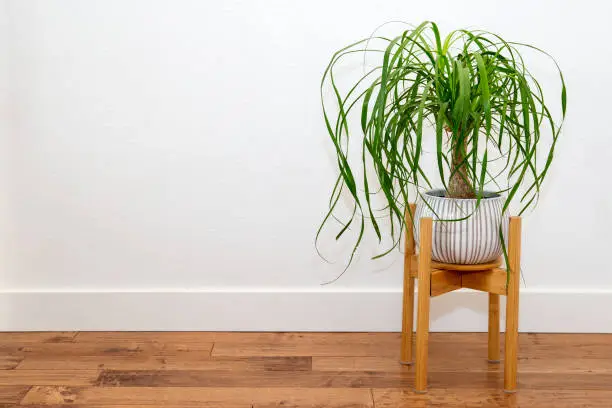
The Ponytail Palm is a striking addition to any home, blending elegance with ease of care. Despite its name, this plant is actually a succulent, with a bulbous trunk and cascading, ribbon-like leaves that add a touch of charm to your indoor space.
Safety Profile
Good news for cat owners: the Ponytail Palm is non-toxic. While your cat might occasionally nibble on its leaves or scratch its trunk, this won’t pose any serious health risks. However, nibbling could sometimes lead to mild stomach upset [13] .
Growing Requirements in UAE
The Ponytail Palm is well-suited to indoor spaces in the UAE, provided you meet its basic care needs:
| Care Aspect | Requirement |
| Light | Bright, direct to indirect sunlight |
| Temperature | 18°C to 29°C |
| Watering | Let the top 50% of the soil dry out |
| Soil Type | Well-draining cactus potting mix |
| Fertilising | Light feeding in spring and summer |
Maintenance Tips
This plant’s drought-resistant nature makes it a perfect fit for the UAE’s climate. Here’s how to keep it thriving:
Watering Guidelines:
- Water thoroughly only when the soil feels dry to the touch.
- Scale back watering during the cooler winter months.
Environmental Considerations:
- Place your Ponytail Palm in the brightest spot in your home.
- Mist its leaves occasionally to remove dust and keep them fresh.
- Maintain a stable indoor temperature for optimal growth.
Plant Protection
To keep your plant safe from curious cats, consider placing it on elevated surfaces. You can also use citrus-based sprays around the base, as cats tend to dislike the scent. To divert their attention, provide alternatives like cat grass.
Common Issues
Keep an eye out for the following signs to ensure your plant stays healthy:
- Yellowing leaves: A sign of overwatering.
- Soft trunk: Another indication of excess water.
With its low-maintenance nature and non-toxic qualities, the Ponytail Palm is a fantastic choice for creating a cat-friendly indoor garden. Its graceful appearance and resilience make it an easy favourite for plant lovers and pet owners alike.
sbb-itb-8db4b3d
7. Cat Grass (Dactylis glomerata)
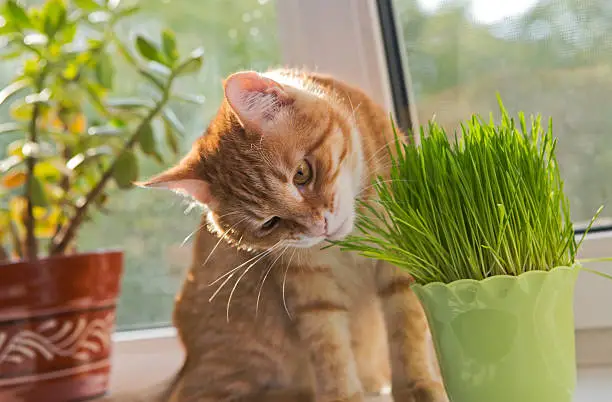
Cat grass offers a simple way to support your cat's digestion, nutrition, and overall well-being.
Health Benefits
Here’s how cat grass can make a difference for your feline friend:
| Benefit Category | Details |
| Digestive Health | Helps with digestion and assists in removing hairballs |
| Nutritional Value | Packed with vitamins A, D, B, and folic acid for added nourishment |
| Wellness Support | Contains chlorophyll, which works as a natural breath freshener |
| Behavioural Impact | Provides enrichment that can help reduce stress and keep cats engaged |
Let’s explore how to grow and maintain cat grass in your UAE home.
Growing Guide for UAE Homes
Soil Method:
- Use a container filled with organic potting soil, leaving 3–5 cm of space at the top.
- Spread the seeds evenly over moist soil, cover lightly with cling wrap, and let them germinate for 3–7 days.
- Once sprouted, remove the wrap, place the container in bright, indirect light, and maintain a temperature of 16–19°C. You can start harvesting within 10–14 days.
Hydroponic Method:
- In a glass container, layer grow stones and place a paper towel or coffee filter on top.
- Sprinkle seeds evenly over the filter, adding water until it just touches the filter.
- Harvest in about 7–10 days.
Follow these methods to keep your cat grass thriving and ready for use.
Maintenance Tips
- Mist the soil daily to keep it moist, but avoid overwatering.
- Trim the grass by about 2.5 cm every other week to encourage fresh growth.
- Replace the grass every 10–21 days once it starts wilting.
- Start new plantings every 1–2 weeks to ensure you always have fresh grass available.
Safety Guidelines
- Limit your cat's intake to under 10% of their diet [14] .
- Observe your cat’s reaction when introducing cat grass for the first time.
- Use only organic, non-GMO seeds for planting.
- Remove and replace any wilted grass promptly.
- Keep your cat away from outdoor grasses, which may contain harmful pesticides.
With proper care, cat grass can be a healthy addition to your home, keeping your cat happy and nourished.
Growing Supplies in the UAE
You can find everything you need to grow cat grass at The Pets Club, including organic seeds, containers, and growing mediums.
Cat grass is an easy and effective way to meet your cat's nutritional and environmental needs while blending seamlessly into your home setup.
8. Haworthia (Haworthiopsis attenuata)
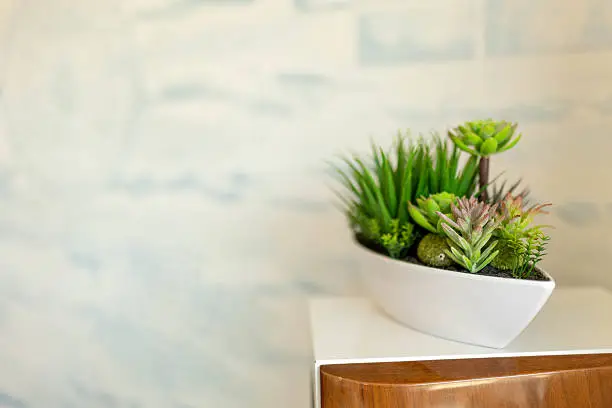
Haworthia, often called zebra haworthia, is a petite succulent that’s safe for cats, dogs, and even horses. While non-toxic, eating large amounts might cause mild digestive issues [15] [16] . Here's how to care for it in the UAE's unique climate.
Care Requirements for UAE Climate
Haworthia thrives when its care is adjusted to local conditions. Here’s a quick guide:
| Aspect | Requirements | UAE-Specific Tips |
| Light | Bright, indirect light | Protect from the intense afternoon sun |
| Temperature | 18–24°C is ideal | Avoid placing near direct AC flow |
| Watering | "Soak and dry" method | Reduce watering during peak summer |
| Soil | Well-draining cactus mix | Mix in extra perlite for better drainage |
| Size | 7.5–15 cm tall | Fits perfectly on shelves and sills |
Maintenance Guidelines
Watering Tips:
- Let the soil dry out completely before watering again.
- Water thoroughly when the soil feels dry.
- Cut back on watering during cooler months.
- Check soil moisture weekly during the hot summer months.
Environmental Considerations:
- Place in bright, filtered morning sunlight.
- Ensure good airflow around the plant.
- Keep it away from direct air conditioning vents.
- Shield it from the scorching afternoon sun.
Where to Find in UAE
You can easily purchase Haworthia plants from several UAE-based retailers:
- Hala Plants: Offers varieties priced between 15 AED and 39 AED (plus VAT) [17] .
- Plant Souq: Sells Haworthia Cooperi and Haworthiopsis attenuata for 55 AED [18] .
In June 2024, Plant Souq reported a 20% boost in Haworthia sales during a campaign aimed at pet owners in Dubai, showcasing its rising popularity.
Health Monitoring
Though Haworthia is safe for pets, it’s always good to stay cautious:
- Observe how your cat interacts with the plant.
- Place the succulent in a stable spot to avoid accidents.
- Watch for any unusual behaviour after contact with the plant.
- If you notice anything concerning, consult your vet.
With the right care and placement, Haworthia can flourish in your UAE home, adding charm to your space while keeping your pets safe.
9. Money Tree (Pachira aquatica)
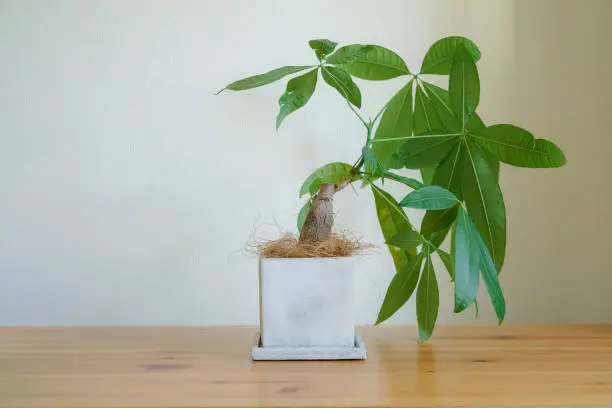
The Money Tree, or Pachira aquatica, is a popular choice for cat-friendly homes in the UAE. According to the ASPCA, this plant is non-toxic to cats, making it a safe option for pet owners looking to add greenery to their living space [20] .
Safety Profile and Cat Behaviour
While the Money Tree is safe for cats, consuming large amounts of any plant material can sometimes cause mild digestive discomfort [19] . As one source notes, "Even non-toxic plants can cause mild symptoms that should not be ignored" [21] .
Let’s take a closer look at how to care for this plant in the UAE’s unique climate.
Care Requirements for UAE Climate
| Aspect | Requirement | UAE-Specific Guidelines |
| Light | Bright, indirect | Place where it gets bright, indirect sunlight; avoid harsh direct sun |
| Watering | Moderate | Water when the top 2.5 cm of soil feels dry |
| Humidity | Medium to high | Mist regularly, especially during dry conditions |
| Placement | Elevated | Use hanging planters or tall stands to keep it out of your cat's reach |
These care tips are especially useful for maintaining a healthy plant while ensuring your cat’s safety.
Maintenance Tips for UAE Homes
To keep your Money Tree thriving in an indoor setting, follow these simple steps:
- Water only when the top 2.5 cm of soil is dry to avoid overwatering.
- Ensure the pot has proper drainage to prevent root rot.
- Protect the plant from the intense afternoon sun by choosing a shaded spot.
- Mist the leaves regularly to maintain adequate humidity levels.
These practices not only promote plant health but also align with creating a safe environment for your cat.
Expert Insight
"Money trees are one of the best options for cat owners who also want houseplants. They are beautiful, easy to care for, and not toxic to cats" [22] .
Cat-Friendly Placement Strategies
- Place the plant on high surfaces or in hanging planters to keep it out of your cat’s reach.
- Use natural deterrents like citrus peels around the base of the plant to discourage curious cats.
- Make sure the pot is stable to prevent tipping accidents.
10. Moth Orchids (Phalaenopsis)
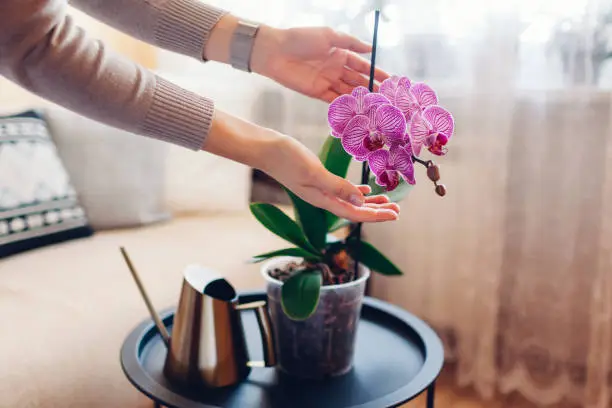
Moth Orchids bring a touch of sophistication to homes in the UAE and, importantly, are safe for cats. According to the ASPCA, these orchids are non-toxic to cats, making them a perfect choice for pet owners who want to enjoy greenery without worry [23] .
Safety Profile
Although Moth Orchids are non-toxic, cats that nibble on them might experience mild stomach upset [24] .
Care Requirements for UAE Climate
| Care Aspect | Requirement | UAE-Specific Guidelines |
| Temperature | 18–27°C during the day; above 15°C at night | Shield from sharp temperature changes |
| Humidity | 40–70% | Use a humidifier or a pebble tray to maintain optimal levels |
| Light | Bright, indirect light | Place near an east-facing window with filtered sunlight |
| Watering | Water when the top ~2.5 cm of the growing medium feels dry | Ensure proper drainage to avoid root rot |
Keeping Orchids Healthy in UAE Conditions
With UAE summers reaching highs of 39.37°C in July [25] , it’s essential to shield your orchid from harsh afternoon sunlight. Place it in a spot that avoids direct exposure during peak hours to prevent leaf burn. Additionally, ensure the orchid's environment is well-managed to keep it thriving and out of reach of curious cats.
Cat-Safe Placement Tips
- Place orchids on high shelves or use hanging planters.
- Sprinkle a bit of cinnamon around the plant as a safe, natural deterrent for cats.
- Secure the pot to avoid accidental tipping.
- Avoid exposing cats to artificially dyed blue orchids, as they may contain harmful substances [24] .
Managing Humidity Levels
Humidity in the UAE can vary, from around 43.2% in May to 58.1% in January [25] . To keep your orchid happy, use tools like a humidifier or a pebble tray to ensure the air stays moist, as these methods can help replicate the orchid's natural environment.
Plant Care Guide: Quick Reference
This guide provides a handy summary of essential plant care tips tailored for homes across the UAE. Use it alongside the detailed advice above to keep your plants thriving.
| Plant Name | Light Requirements | Summer Watering (May–Sept) | Winter Watering (Dec–Feb) | Humidity & Temperature | UAE Tips |
| Spider Plant | Bright, indirect light (east/north-facing) | Every 3–4 days | Every 7–10 days | 40–50% | Great for apartments |
| Areca Palm | Bright, indirect light; avoid afternoon sun | Every 3–5 days | Every 7–10 days | 50–60% | Use a pebble tray for humidity |
| Boston Fern | Medium to bright, indirect light | Every 2–3 days; mist daily | Every 5–7 days | 60–80% | Perfect for bathrooms |
| Calathea | Medium indirect light | Every 3–4 days with misting | Every 5–7 days | 50–60% | Use filtered water |
| Parlor Palm | Low to medium indirect light | Every 5–7 days | Every 10–14 days | 40–50% | Suitable for low-light areas |
| Ponytail Palm | Bright, indirect light | Every 10–14 days | Every 3–4 weeks | 30–40% | Ideal for busy plant owners |
| Cat Grass | Bright direct light for 4–6 hours daily | Daily | Every 2–3 days | 40–50% | Replace regularly |
| Haworthia | Bright, indirect light | Every 10–14 days | Every 3–4 weeks | 30–40% | Great for windowsills |
| Money Tree | Medium to bright, indirect light | Every 5–7 days | Every 10–14 days | 40–50% | Protect from afternoon sun |
| Moth Orchids | Bright, indirect light | Every 7–10 days | Every 10–14 days | 50–70% | Use a humidity tray |
Adjust these care routines based on the UAE's unique climate to ensure your plants stay healthy.
Temperature
- Keep indoor temperatures between 18–29°C.
- Avoid placing plants near air-conditioning drafts.
- During summer, when temperatures exceed 40°C, move plants indoors.
- In winter, ensure Calatheas and Moth Orchids stay above 15°C.
Humidity Solutions
To maintain proper humidity levels, especially in air-conditioned homes, try these methods:
- Place pots on pebble trays filled with water.
- Group plants that love moisture together.
- Use a humidifier in rooms with AC.
- Mist sensitive plants during the summer's hottest days.
General Care Notes
- Water plants in the morning or evening to reduce evaporation.
- Always check soil moisture before watering.
- Reduce fertiliser use during the winter months (Dec–Feb).
- Wipe leaves clean once a month to remove dust and improve photosynthesis.
Conclusion and Next Steps
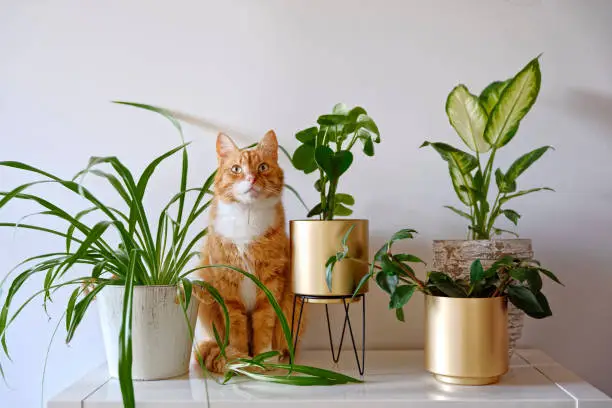
Creating a cat-friendly indoor garden in your UAE home is not only possible but also incredibly rewarding. By adding these safe plants to your space, you can enjoy improved air quality while ensuring your feline companion’s safety.
Safety First
Even though these plants are non-toxic, eating too much of them might cause mild stomach discomfort [2] . If your cat shows any unusual symptoms, it’s always best to consult a veterinarian.
Getting Started
- Choose Your Plants: Pick two or three plant varieties that match your home’s light conditions. Consider placing them in elevated spots or hanging planters to keep them out of reach [1] .
- Control the Environment: Increase humidity using methods like misting or a humidifier, as outlined in our care guide.
These simple steps will help you establish a safe and thriving indoor garden for your cat.
Where to Find These Plants
The Pets Club provides a range of pet-safe plants and supplies tailored to UAE homes, including:
- Hanging planters and wall-mounted options
- High-quality potting mix for indoor plants
- Humidity trays and misters
- Plant-safe deterrent sprays
Once you’ve chosen your plants, follow the recommended care practices to ensure they adapt well to the UAE’s unique environment.
Maintenance Tips for UAE Conditions
To keep both your plants and your cat content:
- Use sheer curtains to filter harsh midday sunlight [1] .
- Run a humidifier in air-conditioned rooms to maintain moisture levels.
- Rotate your plants regularly to ensure even light exposure [1] .
- Opt for a high-quality potting mix and allow the soil to dry out slightly between waterings.
Caring for a pet-friendly garden requires consistent attention, but with the right effort, your plants and your cat can thrive together in harmony.
For personalised advice on setting up your cat-friendly garden, reach out to The Pets Club. Plus, enjoy free shipping on orders above AED 100!
FAQs
What can I do to stop my cat from damaging the safe house plants mentioned in the article?
To keep your plants safe from those curious feline explorers, try placing them in spots that are hard for cats to reach, like hanging baskets or high shelves. Another trick is to use natural deterrents - scatter some citrus peels around the base of the plants, as cats tend to avoid the smell. You can also redirect their attention by offering them their own cat-friendly plants, such as cat grass.
For added protection, set up physical barriers like netting or place double-sided tape or aluminium foil near the plant pots. These textures can discourage cats from climbing or digging. With these straightforward tips, you can maintain a thriving indoor garden while keeping both your plants and your furry friends safe.
How can I maintain the right humidity levels for cat-safe plants in air-conditioned UAE homes?
Maintaining the right humidity for your cat-safe plants in the UAE's air-conditioned homes doesn't have to be complicated. Air conditioning can dry out the air, but a few simple tweaks can help. Grouping your plants together is a great way to create a small, humid microclimate. You could also place a shallow dish of water nearby or use a small humidifier to add some extra moisture.
For a more hands-on approach, lightly mist your plants with water every few days, especially during the hotter months. Just be sure the leaves dry quickly to avoid any mould or pest issues. If you'd rather keep things low-maintenance, consider choosing plants like spider plants or areca palms, which handle varying humidity levels with ease.
What signs should I look out for if my cat has a bad reaction to a non-toxic plant?
While the plants mentioned in this article are considered safe for cats, some felines might still have mild reactions. Keep an eye out for signs like vomiting, diarrhoea, loss of appetite, or lethargy. Occasionally, more concerning symptoms such as excessive drooling, difficulty breathing, or unusual behaviour could appear.
If you notice any of these symptoms, contacting your veterinarian right away is the safest course of action. When bringing new plants into your home, always supervise your cat to make sure they stay healthy and comfortable.


 Facebook
Facebook